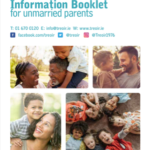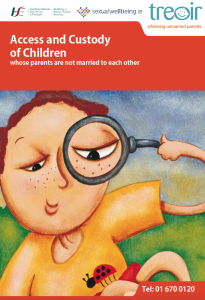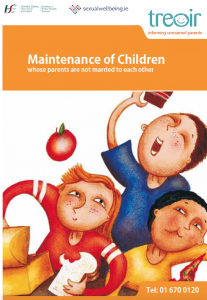Updated: July 2020
Guardianship
What are guardianship rights?
Guardianship is the collection of rights and duties that a biological parent has, or can get, in respect of her/his child. A guardian has a duty to maintain and care for the child and has the right to make decisions in the major areas of the child’s life e.g. choice of religion, school, adoption, consenting to medical treatment and passports, decisions about leaving the country, etc. Guardianship should not be confused with custody, which is the day-to-day care of the child.
Who can be a guardian?
Married parents
Both parents are automatically the legal guardians of any child they may have together.
Unmarried parents
Where the parents are not married to each other, only the mother is automatically a guardian of her child. It is possible for an unmarried father to get guardianship rights by signing a statutory declaration (S.I. No. 210 of 2020) with the mother, by cohabiting with the mother and satisfying the cohabitation period (see guardianship) or by applying to the local district court to be appointed a guardian.
Non-parents
Since the commencement of the relevant legislation contained in the Children and Family Relationships Act 2015, 18th January 2016, it is possible for a person other than a parent to apply to the court to be appointed as guardian of a child.
An application can be made by:
- a person who is married to or is in a civil partnership with, or has been for over 3 years a cohabitant of, a parent of the child and has shared the responsibility of the day-to-day care of the child for at least 2 years
- a person who has provided for the day-to-day care of the child for a continuous period of 12 months or more and where there is no parent or guardian willing or able to exercise guardianship rights and responsibilities in respect of the child. TUSLA the Child and Family Agency will be notified of such an application.
NOTE: The appointment of additional guardians shall not affect the guardianship rights of existing guardians. Guardianship rights for non-parents may be limited to making day-to-day decisions for the child. The court will make its decision in the best interests of the child and may have regard to the views of the child where possible given the child’s age and understanding. Each parent or guardian of the child will be notified of an application to appoint a person other than a parent as a guardian of a child. The consent of all guardians will be required. However, the court may make an order dispensing with the consent of a guardian if it is satisfied that the consent is unreasonably withheld and that it is in the best interest of the child to make such an order.
A court-appointed guardian continues to be a guardian of a child up until the child reaches 18 years of age (unless the court orders otherwise).
Access
Access is the right of a child and a parent (or any person who has acted as a parent) who do not live together to spend time together. This is not an automatic right.
Where a relationship ends, it may be possible for both parties to the relationship to come to an informal arrangement whereby the non-resident partner may have access to the child on a regular basis. If you are having difficulty in making arrangements regarding access you could consider attending mediation. A mediator can help you draw up a parenting plan.
The Family Mediation Service: 01-634 4320, www.legalaidboard.ie
Mediation Institute of Ireland: 01-609 9190, www.themii.ie
If you cannot come to an agreement, you may apply to the local district court for access to the child.
Where a non-parent applies to the court for access, the court, in arriving at a decision, must always have regard to:
- the applicant’s connection with the child
- the risk if any, of the application disrupting the child’s life to the extent that the child would be harmed by the access
- the wishes of the child’s guardians
- the views of the child
- whether or not an access order is necessary.
Custody
Custody is having the responsibility for the day-to-day care of a child.
A parent can always apply to the court for a custody order. The court may also grant an order for custody on application by:
- a person who is a relative of a child, or
- a person with whom the child resides if that person is or was married to, or in a civil partnership with, or has cohabited with the parent of the child for a period of at least 3 years and has shared the day-to-day care of the child for at least 2 years, or
- a person with whom the child resides and who has had the day-to-day care of the child for a continuous period of not less than 12 months and the child has no parent or guardian who is willing or able to exercise the rights and responsibilities of guardianship in respect of the child.
Before making an order for custody the court will require the consent of all guardians. However, the court may dispense with the need for consent if it is satisfied that it is in the best interests of the child to do so. Any decision made by the court will be made in the best interests of the child and the court will consider the views of the child where possible given his/her age and understanding.
The court can also make an order for joint custody and specify where the child is to live. Where the child is not living with one of his/her parents, for any period, the court can specify what access arrangements, if any, are to be put in place.
Child Maintenance
Both biological parents have a responsibility to financially maintain their child whether they are living with them or not. Where a relationship breaks down the non-resident parent is obliged to pay child maintenance to the parent who has the day-to-day care of any children they may have had together.
Cohabitants
A cohabitant of a person who is a parent, or a cohabitant of a person who has the day-to-day care (is in loco parentis), of a child may have to financially maintain the child if that cohabitant:
– is a guardian, and
– is not the parent.
The court shall consider all the circumstances of the case, in particular the income of both cohabitants and any maintenance responsibilities they may have towards any other children or former partners. If a non-parent is ordered to pay maintenance the order will remain in place up until the child is 18 years of age, unless the court orders otherwise.
NOTE
Treoir 2019
While every effort has been made to ensure that the information in this leaflet is accurate, no responsibility can be accepted by Treoir for any error or omission.
Download the Information Pack here
Guardianship of Children Leaflet
Access and Custody of Children
Maintenance of Children Leaflet




